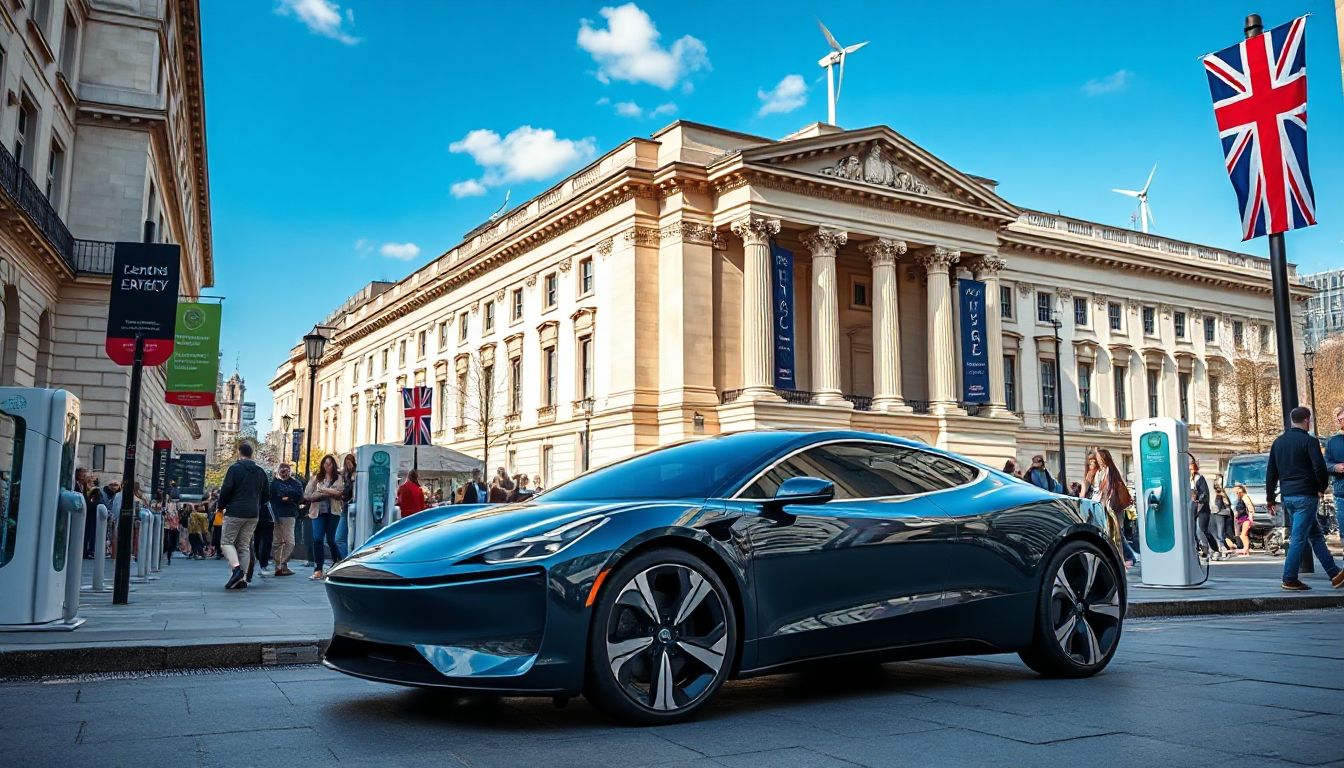Introduction
The UK is going all-in on electric vehicles to cut down pollution and meet its climate goals. By 2050, the government aims to reach net-zero emissions, and EVs play a big role in this plan. Right now, more people in the UK are switching to electric cars than ever before. Latest figures show electric vehicle sales have doubled in just a few years, with thousands hitting the roads monthly. Governments, cities, and industry leaders work together to make EVs more accessible, through grants, better charging networks, and clear laws. These efforts are helping more drivers switch to cleaner, greener drives, faster.
The UK Government’s EV Policy Framework
Overview of National EV Strategies
The UK’s National EV strategies focus on pushing electric vehicles to become the norm. The “Road to Zero” plan aims to make every new car sold in Britain electric by 2030. This bold move means no new petrol or diesel cars will be available after that date. The strategy sets out targets to boost EV sales, build charging stations, and support industry growth. It’s all about reducing emissions and helping Britain lead in clean transportation.
Legislative Initiatives and Regulations
New laws support these ambitions. The government has set strict emissions standards to encourage manufacturers to produce cleaner vehicles. Plus, there’s a ban on selling new petrol and diesel cars from 2030, with a phased approach that tightens rules over time. Planning laws have been updated to make way for more charging stations. Local councils now find it easier to approve places for chargers, so infrastructure can grow faster.
Funding and Incentives
Financial support makes choosing an EV easier. The Plug-in Car Grant reduces the upfront cost of buying electric cars, sometimes by thousands of pounds. Other incentives like tax reductions on EVs, free charging at some stations, and special registration plates help drivers save money. The government also invests in building more charging points nationwide and funds research to make EV tech better and cheaper.
Incentives and Support Schemes for UK Consumers and Businesses
Consumer Incentives
If you’re thinking about switching, there are many perks. Owners of new electric cars can enjoy grants that cut the price. Some regions offer discounts on vehicle tax or provide free parking. Also, used EVs can sometimes qualify for programs that make them more affordable. Applying is easy—just check the government website or local schemes.
Business and Fleet Support
Businesses and fleet owners get special help too. The government offers grants for commercial EVs that lower upfront costs. Companies also benefit from lower taxes on electric company cars and incentives for installing charging stations at workplaces. These benefits make switching larger fleets to electric both easier and cheaper.
Local Authorities and Regional Initiatives
Cities, especially London, lead the charge. London’s Ultra Low Emission Zone (ULEZ) charges high-polluting vehicles to enter the city, pushing businesses to switch. Local authorities partner with private firms to expand charging networks, making it easier for residents and visitors to charge their EVs. These regional efforts speed up adoption across the UK.
EV Infrastructure Development in the UK
Charging Network Expansion
A thriving network is key to mass EV adoption. The government promises to deploy thousands of rapid chargers across the country, including remote areas. The goal is to avoid drivers worrying about running out of charge, especially during longer trips. Public charging points are popping up in cities, villages, and parking lots everywhere.
Fast Charging Technology and Innovations
Charging technologies keep improving. New fast chargers can fill a car’s battery in just 20-30 minutes. Collaborations with private giants like Tesla and Shell are also boosting network size and reliability. These innovations help make EVs as convenient as petrol stations used to be.
Challenges and Solutions
Despite progress, some areas still lack enough chargers. Rural communities often face longer waits or fewer options. To fix this, the government plans targeted investments and policies that simplify building more charging stations. For drivers, planning trips around charging points and using apps to find nearby stations can prevent range anxiety.
Future Outlook and UK Government Commitments
Upcoming Policies and Targets
The UK plans to introduce new policies, like stricter emissions standards and incentives, to reach its 2030 goals. Clean vehicle technology will get more support, helping make EVs more affordable. The government also aims to make Britain a global leader in electric vehicle tech and manufacturing.
Industry Impact and Market Growth Projections
The EV market in the UK is expected to grow rapidly. Predictions show that by 2030, EVs could make up over 70% of new car sales. This shift isn’t just about the environment; it also means new jobs, new industries, and a boost to the economy. Governments see EVs as essential in building a cleaner, more sustainable future.
Expert Opinions and Analysis
Industry leaders see the UK’s push for EVs as a game-changer. Environmental experts applaud it as a critical step toward better air quality and lower carbon emissions. Still, some warn that easy access to charging and affordability remain challenges. Ongoing policies will need to adapt to ensure everyone benefits from this clean transport revolution.
Conclusion
The UK’s approach to electric vehicles is clear-cut and ambitious. Through supportive laws, incentives, and infrastructure, the government is paving the way for widespread EV adoption. Everyone—from individual drivers to big companies—has a part to play. Staying informed about grants, charging options, and future policies will help in making the switch. As the UK moves toward a greener future, embracing electric vehicles isn’t just smart; it’s essential to hitting those climate targets. If you’re considering an EV, now is the perfect time to start exploring your options and be part of Britain’s clean driving future.




